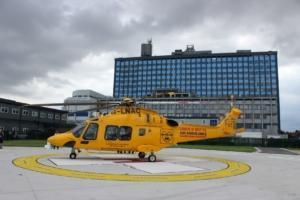£600,000 helipad operational at Hull Royal Infirmary
Helicopters are now able to fly critically ill and injured patients directly to Hull Royal Infirmary after its new £600,000 helipad was declared operational.
Hull University Teaching Hospitals NHS Trust has completed the major construction project so patients seriously hurt in accidents across East and North Yorkshire and parts of Lincolnshire can be flown into the hospital grounds, the Major Trauma Centre (MTC) for the area.
The helipad, behind Hull Royal Infirmary’s £12m Emergency Department (ED), had been funded entirely by the HELP Appeal, the only charity in the country dedicated to funding NHS hospital helipads.
Trust Chief Executive Chris Long said: “We are deeply grateful to the HELP Appeal for its £600,000 donation which has allowed us to construct the helipad directly behind our Emergency Department.
“There is no doubt that having a helipad so close to our highly skilled major trauma team means we will be able to save more lives in situations where every second counts.”
Robert Bertram, Chief Executive of the HELP Appeal, said: “As the Major Trauma Centre for the whole region, funding a helipad outside ED was essential. Everyone is aware of the vital roles that hospitals and air ambulances play in treating a critically ill patient but having a helipad outside the ED can play a significant part in saving vital minutes when transporting a patient to the expert care they need to save lives.
“As the only charity in the country funding live-saving helipads, we are pleased to be able to cover the entire cost of the helipad. We know the difference having a ground-level helipad right outside ED would make.
“With the support of the air ambulances and the excellent emergency care team at Hull Royal Infirmary, this unique mix of helicopters, helipad and hospital medical staff will make a huge difference to those people who may need life-saving treatment urgently.”
Patients were previously flown to the helipad on the other side of the hospital car park on Argyle Street and had to be transferred to Hull Royal in an ambulance along Anlaby Road, one of the busiest roads in the city centre.
Intensive Care Consultant Dr Tom Cowlam, the trust’s clinical lead for the MTC, said: “The new helipad will shorten the journey by a quarter of an hour and remove the need for the patient to be transferred in a second ambulance to the Emergency Department.
“It will make the transfer quicker and more seamless for the trauma patient.
“When you have a really poorly person, this might be the difference between life and death because this could be the time when they are having surgery or a massive blood transfusion to save them.”
Duncan Taylor, Director of Estates, Facilities and Development, said the trust funded the demolition of the Haughton building among others and clearance of the site before main contractor Unico Construction could begin work on the helipad.
Measuring 30 metres by 30 metres, 900 tonnes of concrete were brought onto the hospital site, over the course of one day.
An access road for fire engines and service vehicles has been built alongside a second pedestrian route where patients will be carried out of the air ambulance and rushed into the ED.
Special double fences have been erected around the helipad as “baffles” to reduce noise pollution, provide security and the majority of the site has been turfed with pinned grass covered with mesh overlay to act as a “soakaway” to remove water from the helipad.
Lights have been imported from Holland to be set into the concrete, now covered in specialist paint.
Hull is one of the country’s 27 Major Trauma Centres (MTCs), credited with saving an additional 1,600 people’s lives since they were established in 2012.
Lincs and Nott Air Ambulance use the Hull helipad most often, with Yorkshire Air Ambulance and Derbyshire, Leicester and Rutland Air Ambulance also flying casualties to the city.
The Search and Rescue helicopter, based at Humberside Airport, also lands in Hull with people winched off mountains or those injured on oil rigs or out at sea.
The helipad will also be used by the Children’s Air Ambulance, which can fly specialist medical teams into Hull to treat seriously ill children as well as fly children from here to hospital with specialist paediatric services.


